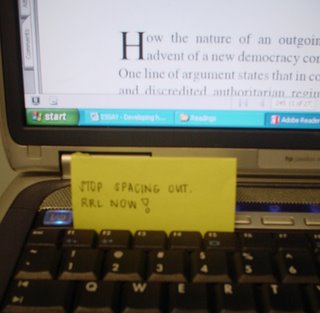In defence of mundanity
When we narrate our biographies, we normally talk of milestones - the first, the best, the most exciting, or in Lesther’s case, the most controversial events come to mind. As if making a resume of social life, we rule out what’s mundane and highlight what makes us special. We tend to forget what consists the bulk of our existence, or at least my existence, are things I routinely do which makes me, me.
This brings me to Zizek’s reflection – “Perhaps the best way of encapsulating the gist of an epoch is to focus not on the explicit features that define its social and ideological edifices but on the disavowed ghosts that haunt it.” (Zizek 2000) This post is not an inventory of loose ends from yesteryears, though recently, certain situations forced me to tighten those loose ends.
It’s about mundane ghosts – old habits that I thought were territorially bound, but apparently not. I guess one indicator that I’m fully settled here is that my old habits started to kick in already. I oversleep, binge, shop (but now, within reason), print on photopaper for fun, compulsively drink coffee, hangout and talk about the strangest things to people I haven’t known for more than a month without being concerned about time. In a way, Zizek is right. The gist of my existence is not really defined by explicit changes, but more of the consistency of the ghosts or habits I unexpectedly maintain wherever I go.
What this post is REALLY about

---
Slavoj Zizek. The Fragile Absolute, London: Verso Books 2000
This brings me to Zizek’s reflection – “Perhaps the best way of encapsulating the gist of an epoch is to focus not on the explicit features that define its social and ideological edifices but on the disavowed ghosts that haunt it.” (Zizek 2000) This post is not an inventory of loose ends from yesteryears, though recently, certain situations forced me to tighten those loose ends.
It’s about mundane ghosts – old habits that I thought were territorially bound, but apparently not. I guess one indicator that I’m fully settled here is that my old habits started to kick in already. I oversleep, binge, shop (but now, within reason), print on photopaper for fun, compulsively drink coffee, hangout and talk about the strangest things to people I haven’t known for more than a month without being concerned about time. In a way, Zizek is right. The gist of my existence is not really defined by explicit changes, but more of the consistency of the ghosts or habits I unexpectedly maintain wherever I go.
What this post is REALLY about

---
Slavoj Zizek. The Fragile Absolute, London: Verso Books 2000


